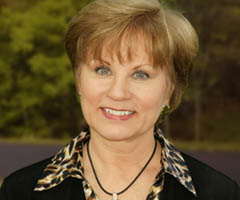Marty Smith
Marty’s Story
It was at lunch in downtown Grand Rapids that Marty’s sister, Diane, 38, told the women of her family she had been diagnosed with breast cancer. There were tears and questions and hugs and more tears. Diane underwent surgery, chemo, and stem cell transplant. Through her journey, she found strength through the support of others.
Wanting to do something positive with her experiences, she founded the Diane Z Breast Cancer Support Group in 1986. This proactive move was important in developing Marty’s attitude and approach to breast cancer.
In 1990, Marty’s mother was diagnosed with breast cancer. A search of family history revealed both her paternal grandfather and his sister also had breast cancer.
Marty knew she was at high risk for developing breast cancer and the general approach of wait and treat was not acceptable to her.
At that time, the emphasis was on early detection through mammograms and better treatment, and little was being done for prevention. Marty chose to re-focus her energy and her life on prevention and educating women about their breast cancer risk.
Clinical Trials
Marty joined a Breast Cancer Prevention Trial in 1994. This was the first prevention trial, designed to determine if the drug Tamoxifen would prevent breast cancer in healthy but high-risk women.
The study showed a 48 percent decrease in the incidence of invasive breast cancers for women in the Tamoxifen arm of the study. While Marty was in the placebo arm of the study, her participation in the trial was instrumental in showing her there was a prevention option.
That first prevention trial led to the STAR (Study of Tamoxifen and Raloxifene) trial, which gave women yet another prevention option against breast cancer.
At the same time Marty was part of the Tamoxifen study, she also was a member of a national Participant Advisory Board which gave her the chance to see and better understand clinical trials. The PAB traveled to Dr. Mary Claire King’s genetics laboratory for a first-hand look at how genes will play a part in cancer prevention in the future and the importance of funding, research and education. Many of the women from this Participant Advisory Board keep in touch to this day, continuing their crusade to make women aware of their breast cancer risk and to know their options for prevention.
Life Now
Today, Marty is cancer-free. Her personal breast cancer prevention program includes combining Raloxifene and a healthy lifestyle.
She and her husband enjoy theater, birding, travel, and their two calico cats. Marty loves to spend time with her two nieces, who give her such pleasure and joy, and she realizes they were an important part of her clinical trial journey. Having been a part of the trial and the opportunity to give them choices about their breast health is extremely important to Marty.
She is still a passionate advocate in educating women about breast cancer prevention and the importance of clinical trials in providing choices about their breast health. Her work has been recognized nationally, and in 2017, she was appointed to the National Cancer Institute’s Cancer Prevention Steering Committee.
“Without clinical trials, we cannot move forward,” Marty says.
“Having been invited to speak at a Senate briefing and a press conference in Washington D.C. about breast cancer prevention reminds me how important it is, and the continued need for research and funding for these trials.
“There are 19 survivors and co-survivors of the Diane Z Group that my sister Diane founded, and I move on by continuing long-term relationships with those special women. They understand the beauty of living now and living fully, and I strive to emulate their model.
“The answers about prevention of breast cancer will impact their daughters, sisters, and nieces, and I’m proud to have been a part of those answers and that discovery.”

Marty Smith
Cancer Prevention

